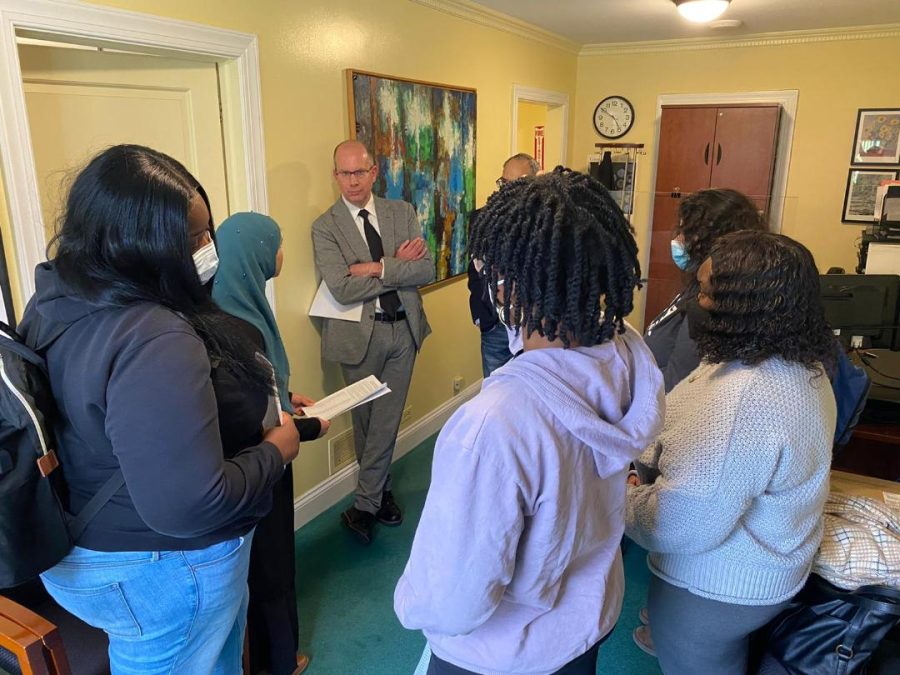Adjunct Union Ratifies Agreement, Mercy Avoids Strike
The Mercy Faculty Forward Union, represented by SEIU, officially ratified an agreement with Mercy College averting a potential strike and ending over two and half years of negotiations.
This three-year agreement was tentatively agreed to late in the evening on April 28 and was later ratified by 92 percent of the adjunct faculty voters on May 3.
As it was with the previous strike authorization vote, the exact number of total voters was not released to adjunct faculty or media.
“Our first contract is a good start and sets a solid foundation towards adjuncts having a stronger voice at Mercy College,” said members of the Mercy Faculty Forward Bargaining Committee in a statement.
The two and half years of negotiations saw both sides meet over 30 times in attempts to make a deal. It was not until final negotiations of three consecutive days leading into a potential strike on May 2 that all parts of the deal could be agreed to.
The new deal for the adjuncts includes a pay increase, improved appointments and assignments, a grievance process, and other demands the union had stated since the beginning of negotiations.
“We look forward to a productive long-term relationship with the SEIU. With many of these types of negotiations, people leave the table feeling like nobody won; with this contract, we are confident that everyone achieved a satisfactory result,” said Laura Plunkett, Director of Public Relation and Community Relations for Mercy College.
In regard to pay, according to the SIEU Initial Contract Summary, the rate will increase to $3,400 for adjuncts without a terminal degree and will increase by $100 the following two years. Adjuncts with a terminal degree with begin at $3,500. Health professionals will begin at $4,600 and those with a terminal degree will start at $5,100. Adjuncts who taught in both semesters the past year will receive a $500 bonus (those who only taught in Spring ’22 will receive $250.) Adjuncts will also receive a one-time $500 bonus after 10 years of service.
If a course is canceled less than two weeks before the start of a term, adjuncts will receive $300. There will also be a fund of $40,000 for adjunct professional development grants. Adjuncts can also enroll in up to 12 credits of graduate study per academic year, and after 10 years, may have one spouse, partner or child enroll in up to six credits per semester at a fifty percent tuition rate.
Adjuncts will also be able to achieve rank based on their terms of service.
However, some adjuncts who have supported and opposed the unionizing of the adjuncts have some concerns regarding the deal.
One such professor is Arthur Sullivan, an adjunct psychology professor, who doesn’t see how aspects of the deal like appointments and assignments can be guaranteed in writing.
“After the pandemic, schools have taken a hit. Enrollment is down everywhere. How are you going to guarantee adjunct of all people employment,” asked Sullivan. “By the nature of the word, we are supplementary.”
The section reference by Sullivan states that Mercy will appoint senior lecturers and instructors for two academic years and assign at least three courses during that appointment.
It also states exceptions to this section include, “where the adjunct is not interested in teaching multiple courses, or where the course previously taught by the adjunct is not offered, or where the number of sections for that course is substantially reduced, or for any similar reason relating to the needs of the College (such as curricular needs, enrollment, and scheduling needs), and subject to the bargaining unit member’s prior performance.”
“I think it’s very realistic,” said Prof. Charles Chesnavage, an adjunct religion professor and member of the Mercy Faculty Forward Bargaining Committee.
Another aspect of this deal that Sullivan believes should make adjuncts consider is the new competition to teach these classes. Now that the college will pay more per course, other adjuncts who worked elsewhere may now be drawn toward Mercy College.
“A lot of adjuncts are not as good as they think they are. A pay increase will draw better adjuncts, and they will be the first out the door. Better quality folks will come here, and it will increase the competition,” said Sullivan.
Chesnavage sees the increase in salary as more of a means to retain the professors who are already working at the college and who may have been drawn elsewhere for more money.
“The increase in salary will do what we want it to do and that stabilizes the faculty, so there is not so much turnover,” said Chesnavage.
An aspect of the labor dispute with Mercy that the adjunct union gives a lot of credit to is the work of a small group of student activists.
“Student activism to me is very powerful because I wanted to be part of something, and I finally got to be a part of something powerful,” said Rebecca Agyemang, student activist and Senior Nursing major.
Agyemang is also the main student responsible for creating the student petition, which was signed by over 1,000 mercy students in support of the adjunct union’s efforts.
In addition to Agyemang, Loushema Lott-Coakley became heavily involved in supporting the adjuncts and is looking forward to what lies ahead for them.
“I hope it will continue to improve and not for the sake of shutting up the professors,” said Lott-Coakley.
Both her and Agyemang were some of the students involved in the “Chalk Talk Protest” on April 27. The group of student activists wrote pro-adjunct union slogans on the sidewalks around Verrazano Hall in an attempt to increase pressure to make a deal.
The next step for the adjunct union will be to continue to work with students activist to improve what they view as areas of needed improvement at Mercy.
Chesnagve also stated how they intend to begin the next set of negotiations in two years in order to get a head start on the next round.

This will ensure two years of labor peace with the adjunct union and the college, which hasn’t existed since early 2019. Chesnavage states his optimism following the adjunct’s first deal.
“Right off the bat, we are better off than we were.”

James Tiedemann graduated from Mercy College in the May of 2022. He transferred there after graduating from SUNY Orange with his Associate's Degree in...












